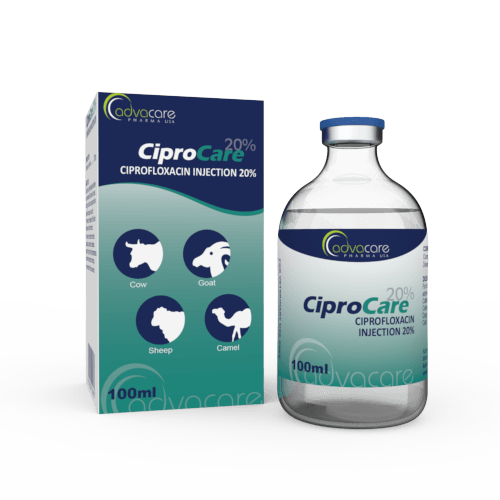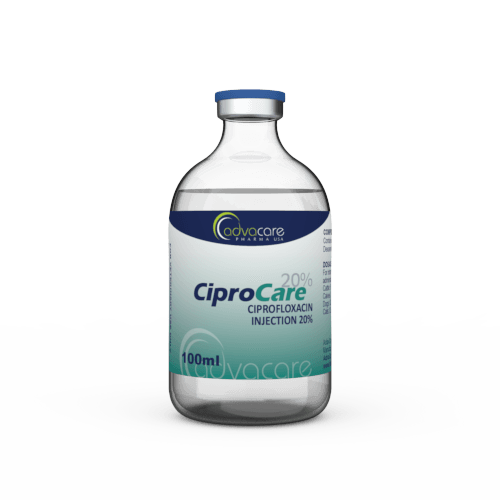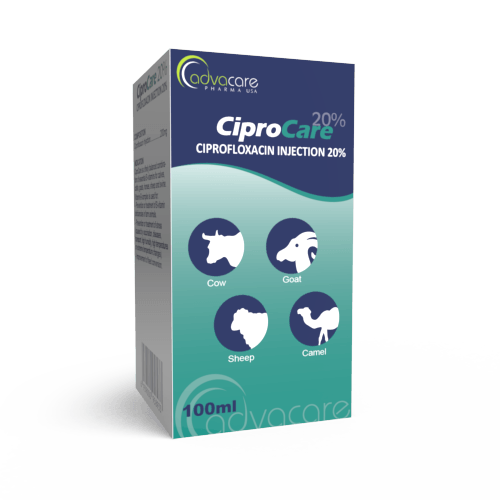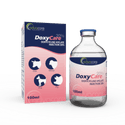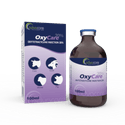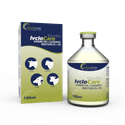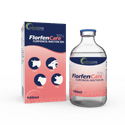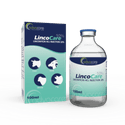- Home›
- Veterinary Pharmaceuticals›
- Veterinary Injections›
- Veterinary Liquid Injections›
- Ciprofloxacin Injection
Ciprofloxacin Injection
Dosage
Packaging
What is Ciprofloxacin?
Active Ingredients: Ciprofloxacin
Ciprofloxacin Injection is a fast-acting antibiotic drug used to treat infections in many types of animals, including dogs, cats, poultry, goats, sheep, camels and cows. It is commonly used to treat infections of the urinary tract, skin, or respiratory system. Ciprofloxacin is effective for gram-negative and gram-positive bacteria.
Ciprofloxacin is a fluoroquinolone antibiotic. It works by interfering with the enzymes responsible for DNA replication, which stops protein synthesis. Ciprofloxacin displays bactericidal activity against a broad spectrum of microorganisms, including Pseudomonas aeruginosa, Klebsiella, E. coli, Enterobacter, Salmonella, and Proteus.
Administration of this drug should be based on the sensitivity of the causative organisms, the severity of infection, and the status of the animal's immune system. Dosage regimen and the duration of therapy should be individualized. It's essential to complete the prescribed course of treatment even if symptoms improve in order to prevent the development of resistance. Should resistance happen, it can render the drug ineffective against that strain of bacteria in the future, potentially limiting treatment options and increasing the risk of complications or prolonged infections.
Note that this drug is for veterinary purposes only. Ciprofloxacin Injections should be prescribed by a veterinary doctor or animal care specialist. It is crucial to conduct susceptibility tests prior to starting therapy to determine the drug's appropriateness.
In case of an adverse interaction or side effect, cease administration immediately and consult a veterinarian. The prescribed dosage and duration should always be followed to ensure effective treatment.
Ciprofloxacin Injection is available in 100mg/ml (10%) and 200mg/ml (20%) dosages in 50ml and 100ml vials.
AdvaCare manufactures this veterinary medicine in GMP-certified factories located in China, India, and the USA. Our company ensures stringent quality control measures during the production. From raw material sourcing to the final product testing, every stage undergoes rigorous checks. We offer a broad range of high-quality veterinary medications available for distribution.
Why are we a trusted Ciprofloxacin manufacturer?
Ciprofloxacin Injection is manufactured and globally distributed by AdvaCare Pharma, a leading manufacturer of veterinary injections in the pharmaceutical industry. We have been committed to distributing high-quality, GMP-certified veterinary medications for the global market over the past 20 years. As a top Ciprofloxacin manufacturer, we ensure that all of our 100+ veterinary injections surpass our distributors' requirements by conducting routine internal and third-party facility audits.
Uses
What is Ciprofloxacin used for?
It's used to treat bacterial infections such as:
- mycoplasma pneumonia
- peripneumonia
- pasteurella disease
- colibacillosis
- salmonellosis
- streptococcosis
- actinomycetes
- mastitis
What animals can be treated with Ciprofloxacin Injection?
It's recommended for many species of animals, including rabbits, companion animals, poultry, and livestock like camels, cattle, goats, and sheep.
How is a Ciprofloxacin Injection used?
This medication has been manufactured as a liquid, which is packaged in a vial. It is intended to be administered by injection. Ciprofloxacin Injection is intended for veterinary use only.
What is the mechanism of action of Ciprofloxacin?
Ciprofloxacin functions by inhibiting bacterial DNA gyrase and topoisomerase IV enzymes, both vital for bacterial DNA replication, transcription, repair, and recombination. Bacterial growth is halted and the infection is curbed.
How is the correct dosage of Ciprofloxacin determined?
Dosage is typically determined by the animal's weight, the severity of the infection, and the specific type of bacteria being targeted.
Are there any known side effects of Ciprofloxacin Injection in animals?
Yes, potential side effects include digestive upset, joint abnormalities in young animals, and central nervous system disturbances. Animals must be monitored closely following administration.
What is the withdrawal period for Ciprofloxacin?
The withdrawal period is 12-15 days. This period ensures that residues of the drug have sufficiently cleared from the animal's system before the animal-derived products are consumed.
Can Ciprofloxacin be used in conjunction with other medications?
While the drug can be used with many medications, it has known interactions with certain drugs, like antacids and theophylline. Bacterial resistance can also develop against it, as with other antibiotics.
Is Ciprofloxacin effective against all types of bacteria?
No, the drug primarily targets gram-negative and some gram-positive bacteria. It is less effective against anaerobic bacteria. The specific bacterial infection's nature should be identified before treatment.
What should be done in case of an overdose?
In case of an overdose, the administration should be stopped immediately. The animal should be monitored for signs of toxicity. Supportive care, especially hydration, should be provided.
What are the considerations for pregnant or lactating animals?
Ciprofloxacin should be used with caution in pregnant or lactating animals. While it can cross the placental barrier, the effects on the fetus are not entirely known. It might be excreted in milk, potentially affecting nursing offspring.
How long does it take for Ciprofloxacin to show results?
This varies based on the severity and type of infection. Improvements are usually seen within a few days of consistent treatment. If no improvement is noticed after a predetermined period, the veterinarian should re-evaluate the treatment approach.
Are there any regulatory considerations when importing or distributing Ciprofloxacin Injection?
Importers and distributors should be aware of local regulations concerning the importation, distribution, and sale of veterinary medications. Ciprofloxacin may be subject to specific restrictions in certain jurisdictions. It's crucial to ensure all necessary licenses and certifications are obtained.
How should the drug be stored?
This medication should be stored in a dark, dry location under 25°C. Do not freeze. Ensure the vial is sealed tightly to prevent contamination and maintain the drug's efficacy.
What are the storage guidelines for bulk quantities?
Conditions are the same as keeping stocks of this drug in small amounts. The storage facility should maintain a consistent temperature below 25°C and should be routinely checked for any signs of contamination or damage to packaging. Proper ventilation is critical to prevent moisture accumulation.
Dosage
How much Ciprofloxacin Injection should be given to dogs?
The usual dose is 5-15mg/kg, given once per day or divided and given every 12 hours.
How much Ciprofloxacin Injection should be given to cats?
The usual dose is 5-15mg/kg, given once per day.
How much Ciprofloxacin Injection should be given to poultry?
For chickens and turkeys, the typical dose is 10mg/kg body weight, administered once daily for 3-5 days.
How much Ciprofloxacin Injection should be given to cattle?
In cows, the initial priming dose is 5.62mg/kg body weight, followed by a maintenance dose of 5.37mg/kg.
How much Ciprofloxacin Injection should be given to horses?
The recommended dose is 5-10mg/kg body weight, given once a day depending on the severity and type of infection.
How much Ciprofloxacin Injection should be given to rabbits?
For rabbits, the typical dose is 10-15mg/kg, given once a day for 5-7 days.
What can be done in case of a drug overdose?
In such a case, get immediate veterinary care. Symptoms of overdose may include loss of appetite, vomiting, diarrhea, increased thirst, tremors, or seizures. The animal should be kept in a calm environment, and intravenous fluids may be administered to maintain hydration and counteract possible nephrotoxic effects.
Refer to a veterinary doctor or pharmacist for guidelines on dosage.
Side Effects
As with all pharmaceuticals, some unwanted effects can occur from the use of Ciprofloxacin Injection.
Some common side effects may include but are not limited to:
- gastrointestinal effects (appetite loss, vomiting, diarrhea)
- lethargy or general weakness
- increased thirst or urination
Serious side effects may include:
- allergic reaction (skin rash, fever, facial swelling, or difficulty breathing)
- vision changes in cats
- seizures or convulsions
- joint pain or swelling, particularly in young animals
For a comprehensive list of all possible side effects of this medication, consult a veterinarian.
Precautions
Do NOT use Ciprofloxacin Injection for an animal that:
- has a known allergy or hypersensitivity to any of the ingredients.
- is young and still growing, as ciprofloxacin may cause cartilage abnormalities.
- has a history of seizures or other central nervous system disorders.
Treatment with this drug should be administered with caution for an animal that:
- is dehydrated.
- has hepatic or renal insufficiencies.
- is pregnant or lactating.
- has a known history of joint-related issues, as fluoroquinolones may exacerbate musculoskeletal disorders.
There are known interactions between ciprofloxacin and other drugs, including antacids and theophylline. Concurrent administration with certain drugs, such as nonsteroidal anti-inflammatory drugs (NSAIDs), may increase the risk of CNS stimulation. Co-administration with warfarin or other oral anticoagulants may potentiate the anticoagulant effects.
What are the most common animals Ciprofloxacin Injection is used for?
Ciprofloxacin Injection is typically used for the following animals:
- Dogs: In dogs, it is primarily used for urinary tract infections, skin infections, and other bacterial infections.
- Cats: Ciprofloxacin is occasionally used in cats to treat bacterial infections, especially those resistant to other antibiotics.
- Rabbits: The injection can be used in rabbits for respiratory and other bacterial infections. The dose and frequency of the would be based on the weight of the rabbit and the veterinarian's recommendation.
- Chickens: The drug is used to treat respiratory and other bacterial infections in chickens. Its use must be under strict supervision as there are concerns about antibiotic resistance and drug residues in meat and eggs.
- Turkeys: Similar to chickens, ciprofloxacin can be used to combat various bacterial infections in turkeys. The same concerns about antibiotic resistance and potential for drug residues apply.
- Cows: In cows, ciprofloxacin is not a first-line antibiotic due to concerns about antibiotic resistance and milk withdrawal periods. It should be used for specific bacterial infections that are sensitive to this antibiotic.
- Goats: Ciprofloxacin is not frequently used in goats. Withdrawal periods for meat and milk should be considered if used to manage infections to avoid complications in humans after consuming the milk or meat from the same animals.

You might be interested in...
Why AdvaCare Pharma?
As an industry leader, we are aware of our responsibility to provide affordable and sustainable solutions to improve healthcare worldwide.
